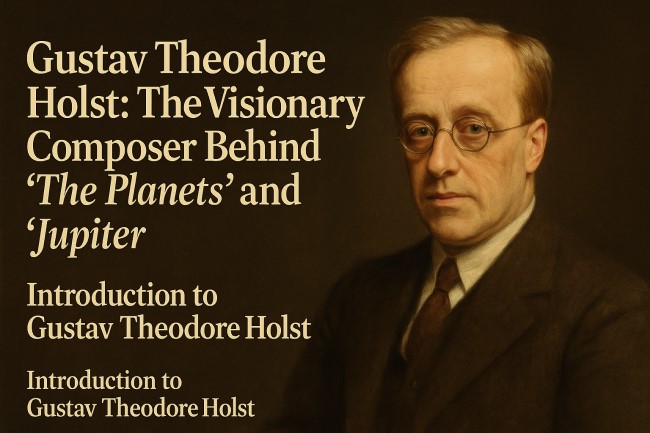Gustav Theodore Holst: The Visionary Composer Behind “The Planets” and “Jupiter”

Introduction to Gustav Theodore Holst
Gustav Theodore Holst was a revolutionary English composer, arranger, and music educator, renowned primarily for his orchestral suite The Planets. Born on September 21, 1874, in Cheltenham, England, and passing away on May 25, 1934, Holst left an indelible mark on 20th-century music. His genius was not confined to a single genre; instead, his work embraced a variety of musical forms, themes, and influences—from English folk songs to Eastern mysticism.
In this article, we’ll dive deep into the life, legacy, and contributions of Gustav Theodore Holst, focusing on key works like The Planets, particularly the movement Jupiter, and explore how his unique style continues to influence modern classical music.
Early Life and Education
A Musical Upbringing
Gustav Holst was born into a family steeped in music. His father, Adolph von Holst, was a skilled pianist and organist, and his mother, Clara, was a singer. Raised in this rich musical environment, Holst quickly developed a passion for music, first learning the piano and violin, and later taking up the trombone due to neuritis in his right hand.
Formal Training
Holst enrolled at the Royal College of Music in London in 1893. There, he studied composition under Charles Villiers Stanford. Despite struggling financially, Holst supported himself as a professional trombonist and began his journey into composing, blending classical techniques with folk melodies and philosophical themes.
Teaching Career and Influence
Shaping Young Minds
Holst wasn’t just a composer—he was also an influential teacher. He served as music master at St. Paul’s Girls’ School from 1905 and director of music at Morley College from 1907. His innovative teaching methods and commitment to musical education earned him high respect.
Composition for Education
Some of Holst’s most enduring compositions, including The St. Paul’s Suite, were written specifically for his students. These pieces reflect both his technical mastery and his understanding of how to make music accessible and engaging for young musicians.
Musical Style and Themes
Folk Influences
Holst drew heavily from English folk music, incorporating its modal harmonies and rhythmic freedom into his compositions. This is evident in works like A Somerset Rhapsody and The St. Paul’s Suite.
Mysticism and Philosophy
Deeply interested in Eastern religions and astrology, Holst studied Sanskrit and became fascinated with Hindu texts. His works such as Savitri and Choral Hymns from the Rig Veda are direct results of these explorations.
Gustav Theodore Holst: The Planets
Creation of a Masterpiece
The Planets, composed between 1914 and 1916, is arguably Holst’s magnum opus. The seven-movement orchestral suite is inspired not by astronomy but by astrology, with each movement reflecting the supposed personality of a different planet.
Structure and Concept
Each movement of The Planets carries a distinct emotional and thematic character:
- Mars: The Bringer of War
- Venus: The Bringer of Peace
- Mercury: The Winged Messenger
- Jupiter: The Bringer of Jollity
- Saturn: The Bringer of Old Age
- Uranus: The Magician
- Neptune: The Mystic
Gustav Theodore Holst Jupiter: A Celebration of Joy
Musical Characteristics
One of the most famous sections of The Planets is Jupiter, the Bringer of Jollity. This movement is exuberant, optimistic, and rich with soaring melodies. The middle section introduces a noble theme that Holst later adapted into the patriotic hymn “I Vow to Thee, My Country.”
Cultural Impact
“Jupiter by Gustav Theodore Holst” has found a place beyond concert halls. It has been used in ceremonies, advertisements, and even royal events, becoming a symbol of joy and national pride.
Holst’s Other Notable Works
The Hymn of Jesus
This choral work reflects Holst’s fascination with early Christian mysticism and his innovation in choral writing.
Savitri
Based on a tale from the Mahabharata, this chamber opera explores themes of life, death, and love. It stands as a unique blend of Western musical tradition and Indian philosophy.
Choral Hymns from the Rig Veda
Set in English translations of Sanskrit hymns, these compositions reveal Holst’s deep engagement with Vedic spirituality and his mastery of choral texture.
Legacy of Gustav Theodore Holst
Influence on Future Generations
Holst’s impact extends far beyond his own compositions. His innovative use of rhythm, orchestration, and modal harmony paved the way for future composers like Benjamin Britten and Michael Tippett.
Educational Contributions
As a teacher, Holst nurtured many young talents and changed the landscape of music education in England. His belief in the value of music for all—regardless of background—remains a guiding principle in modern music education.
Continued Relevance
Today, The Planets remains one of the most performed orchestral works worldwide. Movements like Jupiter continue to captivate audiences, and his experimental spirit resonates in modern film scores and symphonic music.
Conclusion
Gustav Theodore Holst was much more than the composer of The Planets. He was a visionary who saw music as a bridge between worlds—between East and West, the mystical and the material, the academic and the emotional. His works, especially Jupiter by Gustav Theodore Holst, continue to inspire and enchant, cementing his legacy as one of the great innovators in music history.



